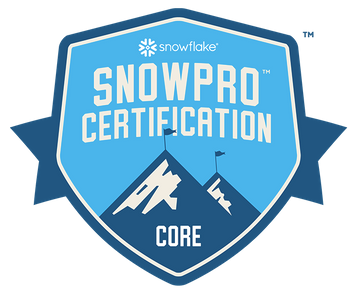
I’m thrilled that I passed the SnowPro Core Certification exam!
It was challenging because to be successful, exam takers must get at least 80% correct answers, which is quite high as compared to other industry exams (edit October 2021: the passing score has since been lowered). Before taking the exam, I wanted to be sure that I was well prepared so that there would be no surprises. In this post I will share how I prepared for the exam and some thoughts about the experience in general.
Preparing for the exam
The first step when taking any certification exam is to review the exam contents and have an understanding of what is covered on the exam, what types of questions there will be, how many questions and how long it would take. Then study time begins.
At the time of taking the exam I had just under a year of experience on Snowflake. Some of this experience was doing exercises on my own and some was on a migration project from Oracle to Snowflake. As a Snowflake newbie, I performed entry-level tasks on the project such as creating tables and views, writing transformations in SQL, and creating functions. I did not use more advanced features, such as user administration, data sharing, setting up a multi-cluster warehouse and so on. To be prepared for the exam, I practiced these features using my own free trial Snowflake account.
It is definitely useful to read the Snowflake documentation, at least the main chapters and skipping the reference sections. But just reading the documentation is not enough, because many topics require more detailed explanations of the concepts and some hands-on experience to really understand how they work.
A valuable resource for preparing for the exam was Snowflake University. The “LevelUp” series is comprised of lessons on some of the topics that are covered on the exam with in-depth explanations, case studies and questions at the end of each lesson to test your knowledge.
Another useful resource for learning were a couple of Udemy practice exams where I enrolled. Although the questions on these practice exams are not the same as the questions on the actual exam and some of the questions have dubious relevance to the exam and some answers to the practice questions are even wrong, I still found them useful for uncovering areas where my knowledge was weak and where I needed to study more.
While just studying the documentation and following the Snowflake University courses might be enough to pass the exam, it would be a huge amount of material to learn and memorize. I always find it useful to try the concepts in practice, either on a real project if I have the opportunity or at least in a sandbox environment, because it allows me to better understand how it works and as a result it is much easier to memorize and recall on the actual exam.
The last weekend before the exam, I spent reviewing everything and I felt I was ready. I passed the exam on my first try.
Thoughts after the exam
After the exam, here are some of my thoughts. The number of questions and the allotted time to answer them seem appropriate and are comparable to other certification exams that I have taken in the past. The difficulty level of the questions also seemed appropriate with respect to the core Snowflake knowledge that was tested.
Some of the questions on the exam required memorizing numbers, for example what is the default warehouse auto-suspend time when creating a new warehouse (this question was one of the practice questions in the Udemy practice exam, not an actual question on the exam, but there were other questions on the actual exam of a similar nature). I don’t see how this is relevant, because when I create a new warehouse in Snowflake, the default value is already populated and I can change it if I wish. Therefore I don’t see the relevance of having to memorize such numbers for the exam, why would I want to know a default value that I will probably forget over time anyway? And even if I needed this information in a real situation, I would always double check either in the documentation or within the Snowflake UI before being certain as I don’t typically rely on my memory alone (edit October 2021: I have since learned that Snowflake is constantly evolving the exam and irrelevant questions are being phased out so there may be fewer such questions in the future).
Overall, I find that the SnowPro Core Certification provides value as it ensures that candidates learn about all aspects of Snowflake, not just those that they are using in their day to day work. Typically, not all features are used in all projects and not all developers have access to the advanced features which require special privileges so there might never be a chance to learn everything on the job. Even if features are not used or developers don’t have the privileges to use them, it is still reasonable to know how everything works in Snowflake for a better understanding of the context or for future use. The SnowPro Core Certification is an excellent base for learning the complete set of Snowflake features and capabilities and a confirmation that the candidate has taken the time and effort to learn.